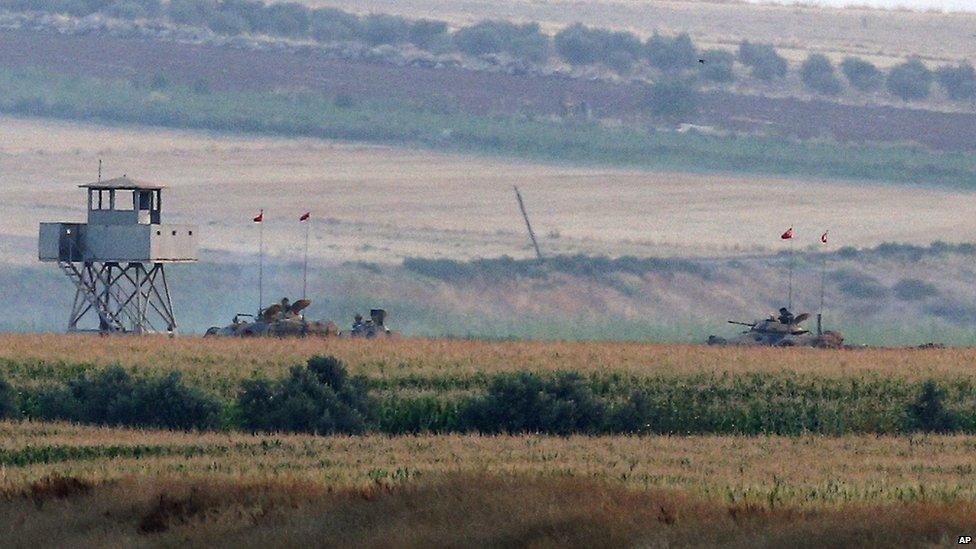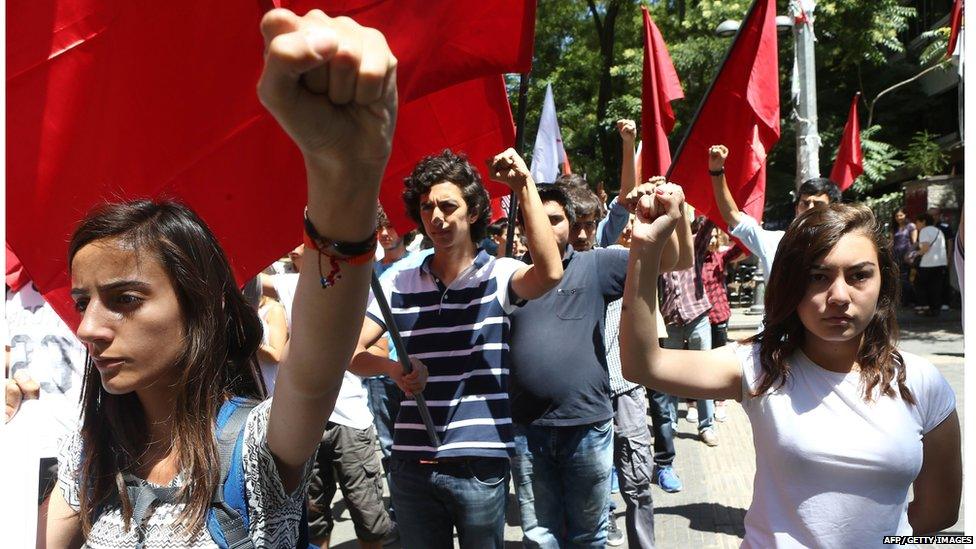Turkey vows to continue campaign against Islamic State militants
- Published
Enis Senerdem from BBC Turkish said people were worried about IS retaliating
Turkey has vowed to keep up a crackdown on Islamic State (IS) militants, after launching its first air strikes against their positions in Syria.
Prime Minister Ahmet Davutoglu said the strikes were part of a broad "process".
Turkish jets are reported to have also carried out strikes against the bases of Kurdish militants in northern Iraq.
Turkey arrested hundreds of suspected IS supporters on Friday and has also said it will let the US use a key airbase to attack IS targets.
A suspected IS bombing killed 32 people in the Turkish town of Suruc this week and IS fighters have since clashed with Turkish troops at the Syrian border.
One Turkish soldier was killed in the exchange of fire at a border post near the Turkish town of Kilis on Thursday.
On Friday, Turkish F-16 jets, based in Diyarbakir, bombed three IS targets in Syria, officials said.
Turkish state TV said the jets had attacked the border village of Havar, next to the Turkish town of Kilis - and had not violated Syrian air space.
However, a fresh attack on IS targets later on Friday did see Turkish jets entering Syrian air space, broadcasters CNN-Turk and NTV reported.
Jets also carried out strikes against camps of the Kurdistan Workers Party (PKK) in northern Iraq, according to media reports and a PKK spokesman.
If confirmed, this would be the first time Turkey has attacked Kurds in northern Iraq since a ceasefire was announced with the PKK in 2013.

Analysis: Guney Yildiz, BBC News
It's not clear what goes on in the minds of Turkish military strategists, but picking two simultaneous fights with both the Islamic State and the Kurdistan Worker's Party (PKK) is a really difficult game to play.
Tactics like employing suicide bombs against civilians make IS a very dangerous group. The PKK, on the other hand, is a totally different organisation with mass support across Kurdish regions of Turkey and Syria. The Turkish-Kurdish opposition People's Democracy Party (HDP), which is seen as close to the PKK, won 13% of the vote in June's general election.
The air strikes on the PKK bases in Iraqi Kurdistan follow a gradual increase in tension between the Turkish government and the Kurdish movement in the run up to the elections.
The two sides have been engaged in a peace process that started in early 2013 and a ceasefire has held for the best part of two years. Turkish officials say tension has risen because the PKK leadership has refused to disarm and has started to carry out attacks against security forces. However, the PKK accuses the government of publicly abandoning the peace process, while adopting a nationalist discourse and cracking down on Kurdish activists.


The Turkish government has faced criticism at home and abroad for not doing enough against IS, despite being part of the international coalition fighting it.
In the first attack on Friday, smart bombs struck command centres and a gathering point for IS supporters, an official told the Associated Press news agency.
The agency quotes the private Dogan news agency as saying that up to 35 militants were killed in one of the strikes. However, London-based monitoring group the Syrian Observatory for Human Rights said the number of dead was not that high.
Friday's attacks marked the first time Turkey has confirmed air strikes against targets in Syria since IS began its advance through Iraq and Syria in 2013.
Arrests
"This is a process," Mr Davutoglu said. "It is not limited to one day or to one region. The slightest movement threatening Turkey will be retaliated against in the strongest way possible."
He said Turkey was prepared to send troops across the border into Syria "if there was such a need".
Also on Friday, Turkish police arrested 297 people in raids targeting the alleged supporters of several militant groups, including IS.
Members of the youth wing of the outlawed Kurdistan Workers' Party (PKK) and of a far-left group, the Marxist Revolutionary People's Liberation Party Front (DHKP-C), were also detained.

Turkey has seen a surge in IS-linked violence close to the Syrian border this week
The arrests come after the PKK's military wing said it killed two Turkish police officers on Wednesday. The group claims the men collaborated with IS in the bombing in Suruc, targeting left-wing activists.
In Istanbul, more than 5,000 officers helped search 140 properties.
The state-run Anadolu news agency said there were also arrests in the cities of Ankara and Izmir and in Sanliurfa province, close to the Syrian border.

Protests against the attack in Suruc have taken place in cities across Turkey
Turkish President Recep Tayyip Erdogan said he was "determined to stop forces from other countries" interfering in Turkey, referring to the latest arrests.
The agreement to let the US use the Incirlik airbase, following months of negotiations, was finalised in a phone call between President Barack Obama and Mr Erdogan this week.
It could allow the US to step up air strikes against IS, as it is closer to northern Syria and Iraq than the Gulf, which currently serves as a launch-pad for bombing missions.
Mr Erdogan said the US-led coalition against IS would be allowed to use the base "within a certain framework" - but did not specify what this would be.
Yasin Aktay, vice president of Turkey's governing AK Party, told the BBC that talks had been held with the US to try to agree a no-fly zone over parts of Syria.
"Unfortunately we couldn't come to an agreement with the US on that," he said.
"It is only when Isis (IS) attacked our soldiers on the borders that we retaliated. Isis has many sympathisers in Turkey and that is why Turkish security forces simultaneously carried out operations in Turkey."

A return to Incirlik
The significance of the Incirlik air base in southern Turkey
The US military is more than familiar with the southern Turkish base, and its recent history is tied closely with recent US military operations.
During the first war against Iraq in 1990, US planes were stationed at the base
Humanitarian operations for Kurdish refugees flew out of Incirlik after the war
The base also served as the main hub for operations at the start of the war in Afghanistan in 2001
It acted as the first stop on the way home for thousands of US troops leaving Iraq after the 2003 invasion
Wikileaks claimed the US and Turkey allowed the base to be used to launch rendition flights, external for terror suspects

What is your reaction to the Syrian air strikes and the raids in Turkey? Are you nearby? You can email haveyoursay@bbc.co.uk, external with your story.
Please include a contact number if you are willing to speak to a BBC journalist. You can also contact us in the following ways:
Whatsapp: +44 7525 900971
Send pictures/video to yourpics@bbc.co.uk, external
Tweet: @BBC_HaveYourSay, external
Send an SMS or MMS to 61124 or +44 7624 800 100